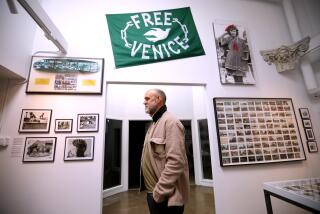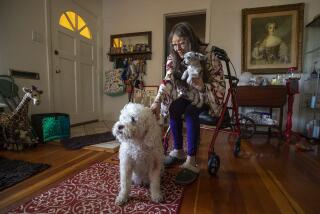Social Conscience Guides Couple
- Share via
She has a doctorate in archeology. He was a successful businessman. She’s an academic and he’s a social activist. She’s exuberant and he’s soft-spoken.
Together, Sandy and Ernestine Elster see the ills in society, and in their separate ways they take action. What the Venice residents have in common is a social conscience. Nowadays they would be labeled liberal, but when they were young, they say, having such an outlook was simply part of being a decent, caring person.
“I grew up in Boyle Heights,” said Sandy Elster, “in the days when we didn’t have homeless--they were called tramps or hobos. From time to time, one would knock on our door and my mother would take him in and sit him down at our kitchen table and feed him and give him food and money when he left. I remember, too, that when he left he would put a chalk mark on the house, which meant this was a friendly house.”
Ernestine Elster said she isn’t as much of an activist as her husband, but added that when she was growing up in New York, people in her family were expected to help others. Her mother worked for an immigration agency before the outbreak of World War II, rescuing European Jews.
Ernestine attended UCLA and was introduced to Sandy by an uncle shortly after she graduated. They were soon married.
“That was 45 years ago,” Ernestine said. “Besides liking and respecting each other, I think the things we do enhance our staying together.”
For the last 10 years, one of the things they have done together is support the Venice Family Clinic, which provides free health care services for about 10,000 patients a year. This year, they were honored by the clinic for their community involvement.
*
Sandy Elster, 77, a retired chief executive of a company that designed and sold equipment for industrial kitchens and hotels, takes his involvement to a personal level. Several years ago the Venice clinic received a $5-million grant for a project called ENRICH (Enriching Neighborhood Resources for Infants and Children). The goal was to take families that had been on government assistance for several generations, provide them with proper medical care and other support, and try to enable them to become independent.
“My responsibility is to find people jobs, and after three years it’s beginning to work,” Sandy said.
*
Sandy devotes several days a week to the ENRICH program. He also spends a day a week working with troubled teen-agers at Venice High School as part of a program called Impact.
“The common ground is that they know that I like them,” he said.
He also spends time working on Amnesty International’s quest to get the United States to ratify the United Nations human rights convention to eliminate all forms of racial and sex discrimination.
Ernestine, 67, entered academia as a second career. Raising a family was the first.
“I was exploring what I wanted to do when my three sons started to leave home,” she said. “I tried several things but a friend suggested I take a course with UCLA Extension because I might find a door which never existed before.
“The course I took was Land and Life in Baja California, and when the professor saw things which I didn’t know existed, I thought, ‘What a thrill to have those kinds of eyes’--I wanted those eyes. I wanted a new way to see the world.”
She earned her doctorate at 52. At times, the new career was rough going, she said. “It wasn’t in the contract when we got married. . . . It was scary for me and difficult for Sandy. But we survived with help from many referees. Our lives have only been enriched.”
Similarly enriched have been the lives of so many who have been the friends or beneficiaries of the Elsters’ friendship. Today, Ernestine is doing research at UCLA in early technology, exploring new questions of gender roles from 4000 BC.
Sandy, meanwhile, is encouraging other senior citizens to join Amnesty International.
“I don’t know a better reason for seniors to put their energies towards seeking a better world than to think of what the world would be like for their grandchildren,” he said.
More to Read
Sign up for Essential California
The most important California stories and recommendations in your inbox every morning.
You may occasionally receive promotional content from the Los Angeles Times.






